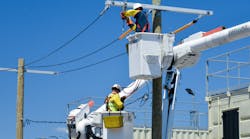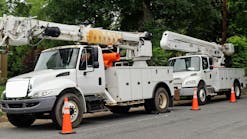Over the past few months, retail stores have closed, restaurants have converted their business models, elective surgeries have been suspended, and many parts of the society have taken a pause. However, pausing is not an option for the day-to-day operations of critical infrastructure industries such as the electric power industry.
Utilities have a long history of managing through unique and demanding circumstances, and COVID-19—though it poses new challenges—is no exception. With line work as their chosen profession, the workers respond safely, as they always do, regardless if it is a hurricane, ice storm or now, a pandemic.
Implementing the Pandemic Response Plan
For years, both major and smaller utilities across the country have been planning their responses to a pandemic. Preparation often involves classifying certain utility personnel as essential. These are employees whose jobs may require them to be in the field and are crucial to ensuring reliability. They may have responsibilities such as restoring power, responding to a gas emergency or ensuring drinking water is flowing. Where possible, other employees are reassigned to support critical work remotely.
At Eversource, which serves about 4 million electric, gas and water customers in Connecticut, Massachusetts and New Hampshire, pandemic response measures include changes to building access, control center/dispatch, field crews, office employees and the redeployment of resources.
Access to each building has been restricted to employees that are required to be onsite to maintain essential service. Employees entering company control centers undergo temperature checks and are provided with sanitizer. All employees are required to practice social distancing and wear a mask appropriate for their job assignment. Eversource management is working closely with local unions to adapt to the changing circumstances to maintain business continuity. From an operations view, the pandemic has changed everything.
Eversource has also restricted access to dispatch facilities, allowing only required employees. Routine clearance and outage planning are now done remotely via video conferencing software. Work essential to maintaining reliability continues to keep service interruptions to a minimum. Non-essential work that requires an outage has been suspended. During shift changes, only the minimum number of employees required to ensure safe and reliable operation of the system remain in the dispatch area while a deep cleaning of the control center is performed. While in the building, employees are required to wear a mask and practice social distancing. In the unlikely event that the spread of the virus takes place at a control center, Eversource is maintaining a clean backup site to put into operation.
For field crews, reporting to a “ready room” is now rare. Crews report directly to their trucks, where they find their preassigned jobs posted on the windshield. Managers and employees conduct the morning safety meeting or “tailboard/tailgate” remotely. Additional trucks have been procured to ensure each crew member rides in his or her own vehicle. Field crews have been assigned to alternative reporting sites, such as substations, at varying times to reduce the chance of people congregating in one location. This also allows for easier contact tracing should an outbreak of COVID-19 occur. Eversource has provided flame-resistant face masks to ensure that employees are protected while working on or near energized wires and equipment.
Supporting Employees
While some of these precautions are new and specific to the pandemic, Eversource has used some components of the plan previously when responding to winter storms. In April, when New England was hit with winds in excess of 50 mph, more than 240,000 Eversource customers lost power, but the company was well prepared. Operating under the precautions taken in its pandemic plan, the company was able to restore power to most of its customers within 24 hours. Additional support contractors were onboarded successfully using remote reporting and safety briefings.
In March, as the realities of the pandemic set in, Eversource pivoted to convert roughly half of its staff to remote employees. Working through its IT department, Eversource was able to ensure that everyone had a laptop and virtual network access. Leaders are also working directly with employees to provide the necessary tools to be successful, whether that means additional monitors, specialized software like GIS and load forecasting tools or even enhanced Internet access. Eversource has not seen a decrease in productivity. In some cases, the company has even seen an increase.
Eversource faces the unique challenge of in-person training for about 1,900 field employees in implementing a new work management system. Its solution is to use two recently purchased incident command vehicles with large digital screens on the outside. Thus, in order to maintain proper social distancing, the training can take place outdoors under large canopies.
With many utilities across the country choosing to suspend shut offs for non-payment, employee groups such as collections have had less work to do. Eversource leadership worked with local unions to repurpose employees to perform other functions such as post-storm circuit inspections.
Another group whose functions have changed is those performing home energy assessments. With all in-home energy services suspended to safeguard employee and customer health, Eversource started offering virtual home energy assessments in Massachusetts using video conferencing. This way, energy efficiency specialists can provide the same expertise and personal care they would if they were physically visiting the homes. Constant communication with employees, union leadership, public officials, and customers has been the key to ensuring safety while maintaining essential service.
Eversource community outreach programs provide updates on its pandemic plans via press releases, company websites, and social media. Its involvement goes beyond just providing electric, gas and water services. For example, Eversource recently donated more than $2 million to help support COVID-19 relief and community non-profits like food pantries in Massachusetts, Connecticut and New Hampshire.
Planning for Reopening Strategies
The utility plans for employees currently working from home to continue to do so until at least late summer, and possibly longer. As utilities begin to bring employees back into the workplace, a comprehensive reopening strategy should include elements across four areas:
1. HR policy and procedure changes to reduce exposure to COVID-19;
2. medical monitoring and tracing to promptly identify and isolate infected employees to prevent additional spread;
3. safe work practices with administrative controls that focus on safe and proper work to reduce the duration, frequency or intensity of exposure to the virus (including PPE, face coverings, access to sanitizers and training on implementation of safe practices); and
4. environmental and facility controls with initiatives such as increased air filtration, physical barriers, spacing (for workers, customers, and site visitors), badges, tracing and monitoring.
In order to safely allow reentry into the office workplace environment, utilities will need to establish a strong testing and contact tracing structure. To establish their testing capabilities, utilities must decide the type and frequency of employee tests, and what partnerships and service agreements best address testing needs across their service territory. Utilities will also need to understand how sample collection, transportation, testing, waste disposal, and reporting will be performed.
Through these proactive steps, utilities can safeguard their most important asset—their employees—amidst the ongoing COVID-19 pandemic.






